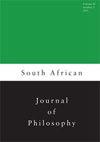African relational ontology, personhood and immutability
IF 0.3
3区 哲学
0 PHILOSOPHY
引用次数: 0
Abstract
In the Western theist tradition, the conception of a person tends to be understood as an intrinsic property. Hence, the classification of someone as a person does not depend on relational aspects of that person. From this, Western theists often understand that their conception of God as a person does not clash with the idea of immutability. In this article, I challenge the idea that being a person and being immutable are compatible properties by using Afro-communitarian philosophy and, more specifically Afro-communitarian metaphysics of personhood. Afro-communitarian metaphysics is fundamentally relational, i.e. it understands that most properties of the world depend on the existence of other entities. More precisely, personhood is a property that depends on the existence of relatable beings. But if this is true, then it is not possible to hold that an entity that has the property of personhood also has the property of immutability. More specifically, an entity that is a person has to change due to the fact that personhood is a relational property. This is because it is a necessary condition for being a person that one relates to others, i.e. one only becomes a person when this relation occurs. Hence, the process of becoming a person requires a moment before the relation with another and one after; thereby, the feature of being a person requires the feature of change. With respect to the Christian conception of God, what this implies is that if theist philosophers wish to understand Him as a person, they have to also accept that God is not immutable. For if other beings besides Him are not eternal, then it is only possible that He can be a person when these other beings first started existing. This is the case because the kind of relationality needed to be a person is not simply to relate to something (like emptiness), but to do something that makes Him addressable (which requires that the thing He relates to has the capacity to address Him). This means there are two moments of existence where He has distinct properties and, therefore, is mutable.非洲关系本体,人格和不变性
在西方有神论传统中,人的概念往往被理解为一种内在属性。因此,将某人分类为一个人并不取决于该人的关系方面。由此,西方有神论者常常明白,他们认为上帝是一个人的观念与上帝的不变性观念并不冲突。在这篇文章中,我通过非洲社群主义哲学,更具体地说,非洲社群主义的人格形而上学,挑战了作为一个人和不可变是相容的属性的观点。非洲社群主义形而上学基本上是关系的,也就是说,它理解世界的大多数属性依赖于其他实体的存在。更准确地说,人格是一种依赖于相关存在的属性。但如果这是真的,那么就不可能认为一个具有人格属性的实体也具有不变性的属性。更具体地说,作为人的实体必须改变,因为人格是一种关系属性。这是因为一个人与他人的关系是成为一个人的必要条件,也就是说,只有当这种关系发生时,一个人才成为一个人。因此,成为一个人的过程需要在与另一个人建立关系之前和之后的片刻;因此,作为一个人的特征需要改变的特征。关于基督教对上帝的概念,这意味着如果有神论哲学家希望把上帝理解为一个人,他们也必须接受上帝不是不变的这一事实。因为如果除了他以外的其他存在不是永恒的,那么只有当这些其他存在开始存在时,他才有可能是一个人。之所以如此,是因为作为一个人所需要的那种关系不是简单地与某件事有关(比如空虚),而是要做一些使他可以被称呼的事情(这要求他所涉及的事情有能力称呼他)。这意味着存在的两个时刻,他有不同的属性,因此,是可变的。
本文章由计算机程序翻译,如有差异,请以英文原文为准。
求助全文
约1分钟内获得全文
求助全文
来源期刊

SOUTH AFRICAN JOURNAL OF PHILOSOPHY
PHILOSOPHY-
CiteScore
1.00
自引率
0.00%
发文量
19
期刊介绍:
The South African Journal of Philosophy (SAJP) is the official publication of the Philosophical Society of South Africa. The aim of the journal is to publish original scholarly contributions in all areas of philosophy at an international standard. Contributions are double-blind peer-reviewed and include articles, discussions of articles previously published, review articles and book reviews. The wide scope of the South African Journal of Philosophy makes it the continent''s central vehicle for the publication of general philosophical work. The journal is accredited with the South African Department of Higher Education and Training.
 求助内容:
求助内容: 应助结果提醒方式:
应助结果提醒方式:


